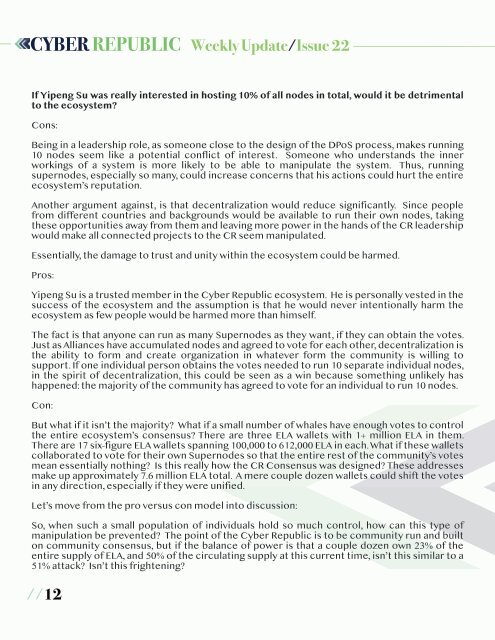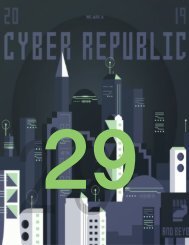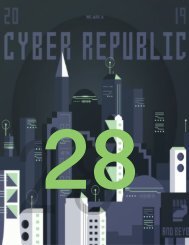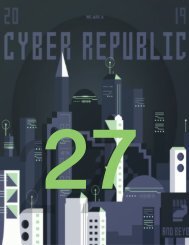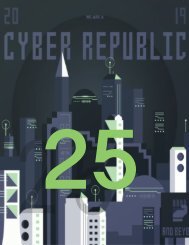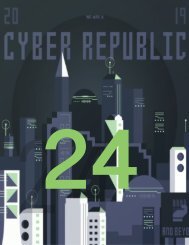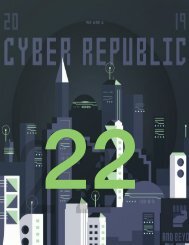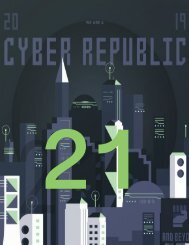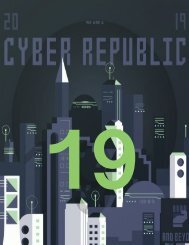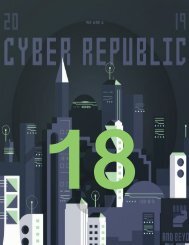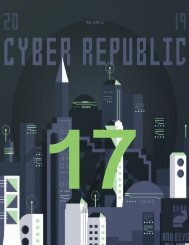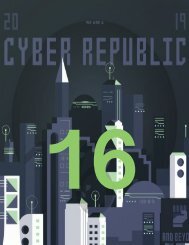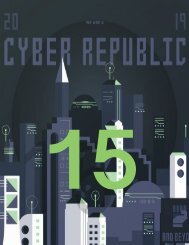Cyber Republic Weekly Update 23
Elections are already underway and members of the Cyber Republic are getting excited for Phase 5,when elected DPoS nodes will fully be deployed and begin finalizing Elastos’ Dual AuxPOW and DPoS Consensus mechanism. This week, the Elastos in a Nutshell Team came out with a comprehensive video and article about Computer Networks and how it relates to Elastos Carrier. Popular YouTuber Crypto Lark released with an all encompassing Elastos video that was very well received by the community, as it was fair in both praise and critique of Elastos. The Elastos private net has been fully updated. The ELA Republic, an Elastos Community Telegram Group, hosted Elastos’ Feng Han in an AMA. We also have an interview with Su Yipeng--Interim Council Member of the CR, updates from the Philippines community, a discussion on FUD and potential vectors of manipulation in DPoS voting and Consensus, an update on CR Partner Hyper and the DPoS Rewards Script being programmed, and we’ll also be breaking down the Elastos affiliated wallets and what differentiates them.
Elections are already underway and members of the Cyber Republic are getting excited for Phase 5,when elected DPoS nodes will fully be deployed and begin finalizing Elastos’ Dual AuxPOW and DPoS Consensus mechanism. This week, the Elastos in a Nutshell Team came out with a comprehensive video and article about Computer Networks and how it relates to Elastos Carrier. Popular YouTuber Crypto Lark released with an all encompassing Elastos video that was very well received by the community, as it was fair in both praise and critique of Elastos. The Elastos private net has been fully updated. The ELA Republic, an Elastos Community Telegram Group, hosted Elastos’ Feng Han in an AMA. We also have an interview with Su Yipeng--Interim Council Member of the CR, updates from the Philippines community, a discussion on FUD and potential vectors of manipulation in DPoS voting and Consensus, an update on CR Partner Hyper and the DPoS Rewards Script being programmed, and we’ll also be breaking down the Elastos affiliated wallets and what differentiates them.
- No tags were found...
Create successful ePaper yourself
Turn your PDF publications into a flip-book with our unique Google optimized e-Paper software.
CYBER REPUBLIC <strong>Weekly</strong> <strong>Update</strong>/Issue 22<br />
If Yipeng Su was really interested in hosting 10% of all nodes in total, would it be detrimental<br />
to the ecosystem?<br />
Cons:<br />
Being in a leadership role, as someone close to the design of the DPoS process, makes running<br />
10 nodes seem like a potential conflict of interest. Someone who understands the inner<br />
workings of a system is more likely to be able to manipulate the system. Thus, running<br />
supernodes, especially so many, could increase concerns that his actions could hurt the entire<br />
ecosystem’s reputation.<br />
Another argument against, is that decentralization would reduce significantly. Since people<br />
from different countries and backgrounds would be available to run their own nodes, taking<br />
these opportunities away from them and leaving more power in the hands of the CR leadership<br />
would make all connected projects to the CR seem manipulated.<br />
Essentially, the damage to trust and unity within the ecosystem could be harmed.<br />
Pros:<br />
Yipeng Su is a trusted member in the <strong>Cyber</strong> <strong>Republic</strong> ecosystem. He is personally vested in the<br />
success of the ecosystem and the assumption is that he would never intentionally harm the<br />
ecosystem as few people would be harmed more than himself.<br />
The fact is that anyone can run as many Supernodes as they want, if they can obtain the votes.<br />
Just as Alliances have accumulated nodes and agreed to vote for each other, decentralization is<br />
the ability to form and create organization in whatever form the community is willing to<br />
support. If one individual person obtains the votes needed to run 10 separate individual nodes,<br />
in the spirit of decentralization, this could be seen as a win because something unlikely has<br />
happened: the majority of the community has agreed to vote for an individual to run 10 nodes.<br />
Con:<br />
But what if it isn’t the majority? What if a small number of whales have enough votes to control<br />
the entire ecosystem’s consensus? There are three ELA wallets with 1+ million ELA in them.<br />
There are 17 six-figure ELA wallets spanning 100,000 to 612,000 ELA in each. What if these wallets<br />
collaborated to vote for their own Supernodes so that the entire rest of the community’s votes<br />
mean essentially nothing? Is this really how the CR Consensus was designed? These addresses<br />
make up approximately 7.6 million ELA total. A mere couple dozen wallets could shift the votes<br />
in any direction, especially if they were unified.<br />
Let’s move from the pro versus con model into discussion:<br />
So, when such a small population of individuals hold so much control, how can this type of<br />
manipulation be prevented? The point of the <strong>Cyber</strong> <strong>Republic</strong> is to be community run and built<br />
on community consensus, but if the balance of power is that a couple dozen own <strong>23</strong>% of the<br />
entire supply of ELA, and 50% of the circulating supply at this current time, isn’t this similar to a<br />
51% attack? Isn’t this frightening?<br />
//12


